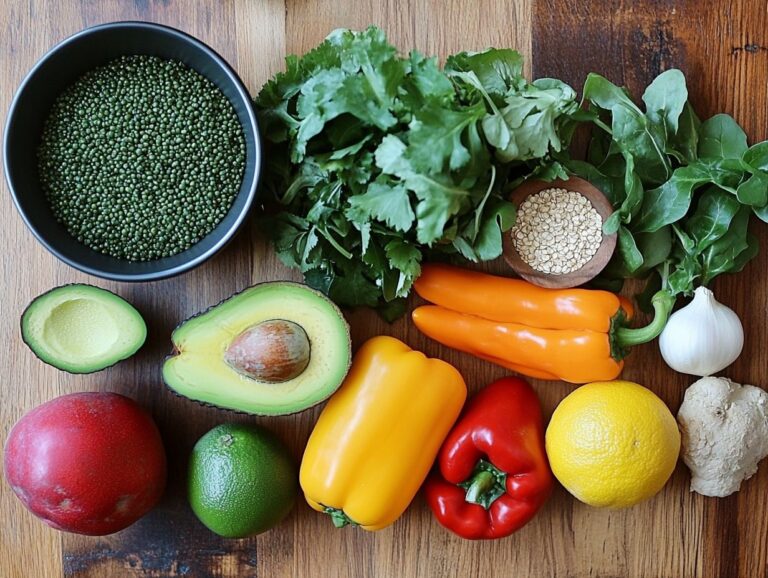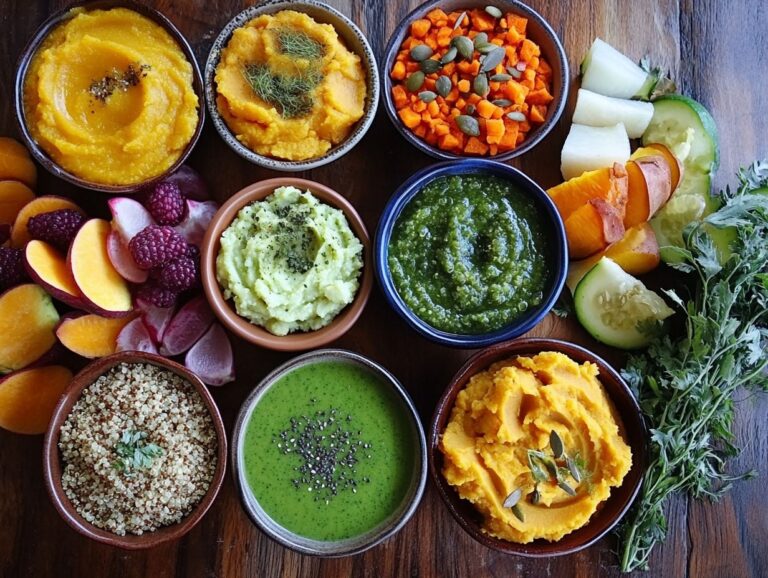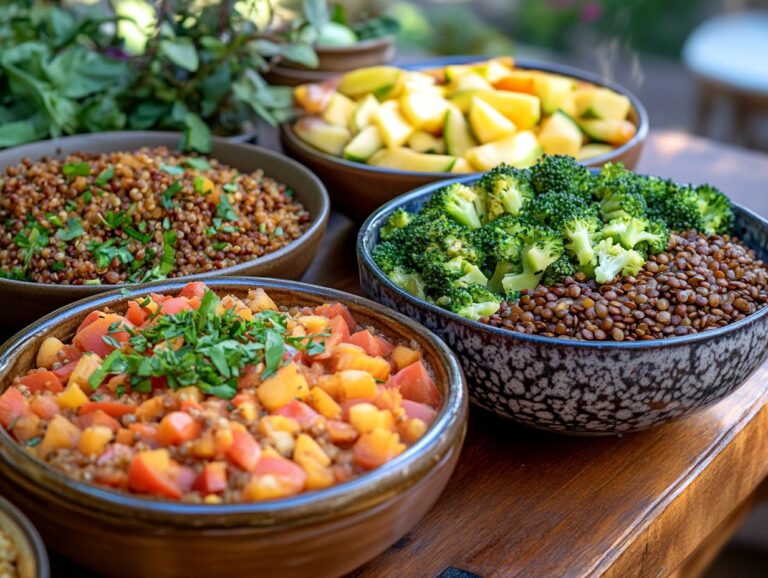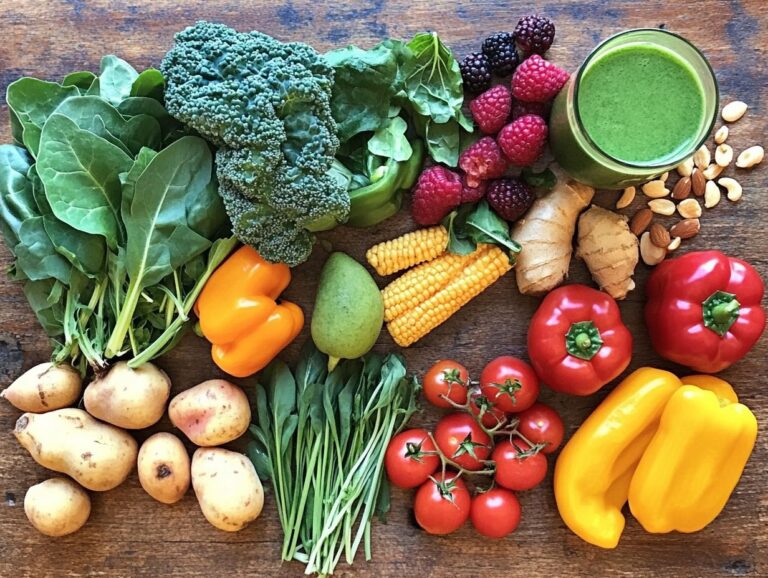The popularity of the vegan diet has surged in recent years, driven not only by ethical and environmental considerations but also by potential health benefits, particularly for individuals with autoimmune diseases. This article explores the relationship between plant-based nutrition and autoimmune health, discussing how a vegan diet can help reduce inflammation, improve gut health, and alleviate symptoms associated with various autoimmune diseases such as lupus and rheumatoid arthritis. Discover which foods to incorporate, which to avoid, and helpful tips for transitioning to a plant-based lifestyle.
Key Takeaways:
- A vegan diet can have anti-inflammatory properties, reduce toxins and allergens, and improve gut health, all of which can benefit those with autoimmune diseases, including systemic lupus erythematosus and ulcerative colitis.
- Autoimmune diseases such as rheumatoid arthritis, lupus, multiple sclerosis, and inflammatory bowel disease can potentially be managed with a vegan diet.
- When transitioning to a vegan diet for autoimmune diseases, it is important to include plenty of fruits, vegetables, whole grains, and plant-based proteins, and avoid processed foods, added sugars, gluten, and dairy products, which can exacerbate disease symptoms and chronic inflammation.
What is a Vegan Diet?
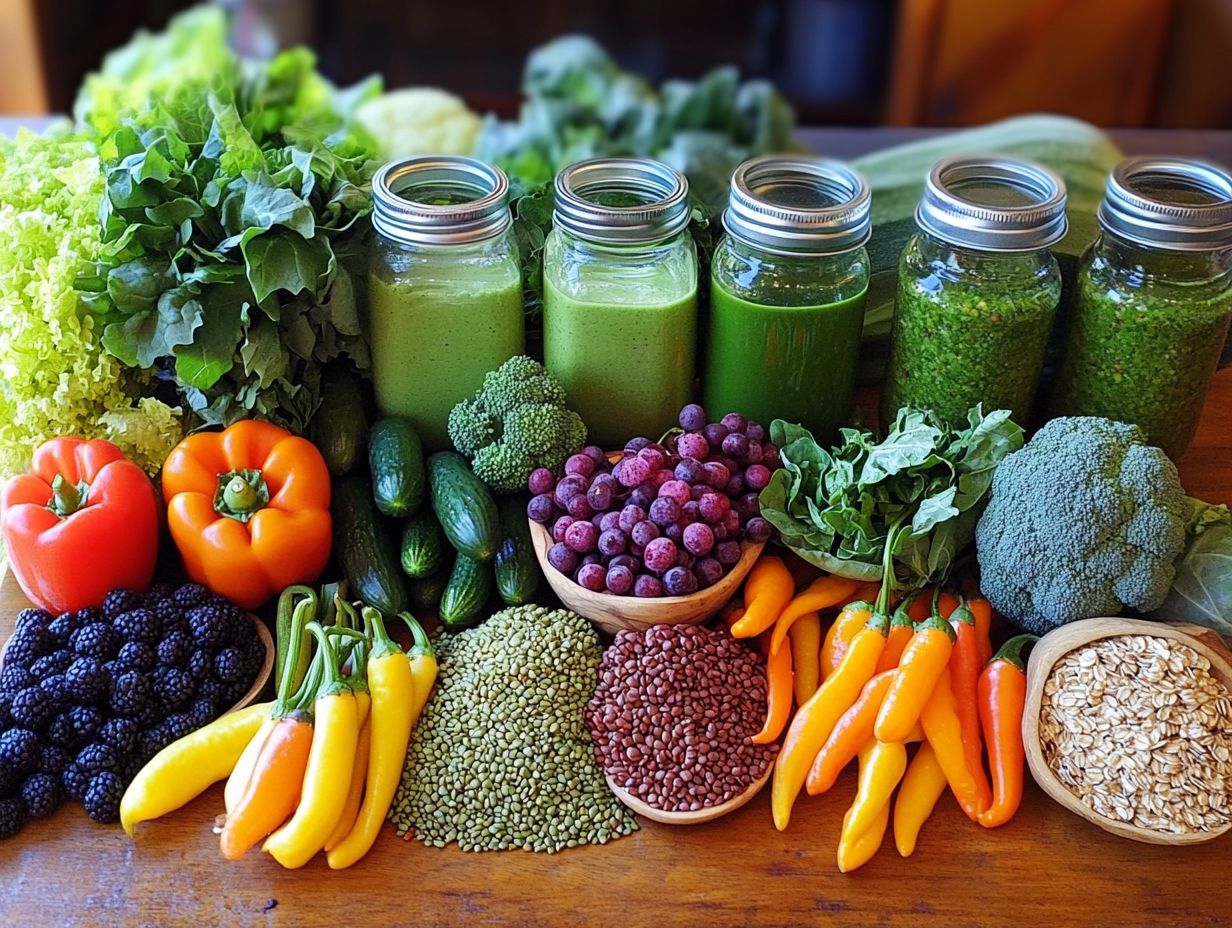 A vegan diet is a dietary pattern that excludes all animal products and focuses on whole plant foods, including fruits, vegetables, grains, legumes, nuts, and seeds. Research has shown that vegan diets can be healthy choices with positive effects on the immune system and chronic inflammation. This lifestyle promotes the consumption of anti-inflammatory foods, which may help alleviate the symptoms of certain autoimmune diseases, such as rheumatoid arthritis and lupus. Additionally, vegan diets encourage the intake of dietary fiber and resistant starch, both of which are essential for the growth of a healthy gut microbiome. A properly functioning gut microbiome is crucial for overall health and immune tolerance, with the presence of beneficial bacteria like Bifidobacterium playing a significant role.
A vegan diet is a dietary pattern that excludes all animal products and focuses on whole plant foods, including fruits, vegetables, grains, legumes, nuts, and seeds. Research has shown that vegan diets can be healthy choices with positive effects on the immune system and chronic inflammation. This lifestyle promotes the consumption of anti-inflammatory foods, which may help alleviate the symptoms of certain autoimmune diseases, such as rheumatoid arthritis and lupus. Additionally, vegan diets encourage the intake of dietary fiber and resistant starch, both of which are essential for the growth of a healthy gut microbiome. A properly functioning gut microbiome is crucial for overall health and immune tolerance, with the presence of beneficial bacteria like Bifidobacterium playing a significant role.
What is an Autoimmune Disease?
Autoimmune diseases are disorders in which the immune system mistakenly attacks the body s own cells, leading to inflammation and tissue destruction, often requiring significant lifestyle changes and dietary adjustments. Conditions such as rheumatoid arthritis, lupus, Sj gren s syndrome, and Type 1 diabetes are often characterized by the involvement of genetic factors in their onset and progression. These diseases can present a wide range of symptoms, including chronic inflammation, fatigue, and pain, which can significantly impact the quality of life. Understanding these disorders is essential for developing effective lifestyle changes and dietary modifications that can help manage symptoms and promote overall autoimmune health.
How Can a Vegan Diet Help with Autoimmune Diseases?
A vegan diet can benefit individuals with autoimmune diseases by reducing chronic inflammation and promoting a healthier immune system, as advocated by experts like Micah Yu, MD. By emphasizing whole plant foods, a vegan diet provides a rich source of dietary fiber and anti-inflammatory nutrients, which can alleviate symptoms associated with conditions such as rheumatoid arthritis and lupus. Additionally, a more diverse gut microbiome can contribute to immune tolerance, potentially enhancing the health of those with autoimmune diseases. Making dietary adjustments, such as eliminating processed foods, may also play a crucial role in managing these conditions.
1. Anti-inflammatory Properties of Plant-based Foods
Plant-based foods are rich in antioxidants, vitamins, and minerals, which provide strong anti-inflammatory properties that can significantly benefit patients with autoimmune diseases. Foods such as leafy greens, berries, nuts, and seeds help reduce chronic inflammation, a common symptom of autoimmune disorders like rheumatoid arthritis and lupus. Incorporating these foods into a daily diet may alleviate pain and enhance overall health and immune system resilience. For instance, dark leafy vegetables like spinach and kale are packed with vitamin K, a vital nutrient that research suggests may lower markers of inflammation. Berries, such as blueberries and strawberries, contain antioxidants called anthocyanins, which have been shown to diminish inflammatory responses. Additionally, nuts like walnuts and almonds are important sources of omega-3 fatty acids, which play a crucial role in reducing inflammation. To include these foods in a vegan diet, one might consider:
- Adding a handful of spinach to smoothies
- Enjoying a selection of berries as a mid-morning snack
- Sprinkling a variety of nuts onto salads or oatmeal
Furthermore, incorporating seeds like chia or flaxseeds is an excellent way to ensure meals are healthy and well-rounded, providing extra fiber and healthy fats.
2. Reduction of Toxins and Allergens
A plant-based diet significantly reduces the intake of processed foods and common allergens, both of which play a crucial role in managing autoimmune diseases. Many processed foods contain additives, preservatives, and unhealthy fats that can increase inflammation and exacerbate symptoms for individuals who are sensitive to them. By focusing on whole foods and minimizing exposure to allergens, people can develop the healthiest diet possible, which can support the immune system and alleviate some challenges associated with autoimmune diseases, as discussed in the Chicago Tribune and Foods publication. For those following this dietary approach, it’s essential to be mindful of specific common allergens, such as gluten, soy, and nuts, which may trigger unwanted responses in some individuals, potentially impacting autoimmune health. Instead of substituting with packaged vegan products that might contain these allergens, individuals can opt for whole foods like quinoa, lentils, and a variety of fruits and vegetables. Nutritious options such as sweet potatoes, chia seeds, and leafy greens can be incorporated into meals to ensure that the diet is both filling and healthy. Meal prep can facilitate this transition by making it easier to stick with healthier alternatives and avoid processed foods that could negatively impact immune health.
3. Improved Gut Health
Improved gut health is another significant benefit of a vegan diet, primarily due to its high content of dietary fiber and resistant starch, which promote a diverse gut microbiome. A balanced gut microbiome is essential for immune tolerance and has been shown to play a key role in managing autoimmune diseases. A plant-based diet can enhance the populations of healthy gut bacteria, improve digestive health, and support a balanced immune response, thereby reducing the severity of disease symptoms. Recent studies published in 2022 have noted a strong association between gut microbiota composition and the onset of autoimmune diseases, suggesting that a thriving microbiome can help modulate inflammatory responses. For instance, experts have pointed out that certain fibers found in legumes, whole grains, and fruits can serve as substrates for probiotics, facilitating their growth. This relationship between diet and bacteria can establish a foundation for stronger immune regulation. Research has shown that individuals with healthier microbiomes exhibit greater resistance to inflammatory diseases, highlighting the importance of dietary practices for overall well-being.
Which Autoimmune Diseases Can Benefit from a Vegan Diet?
 Research indicates that several autoimmune diseases, including rheumatoid arthritis, lupus, multiple sclerosis, and inflammatory bowel disease, can benefit from a vegan diet. This aligns with findings from Marquette University and healthcare professionals advocating for dietary changes. Patients with these conditions may experience symptom relief and improved well-being by adopting a plant-based diet that emphasizes anti-inflammatory foods and dietary fiber. Specifically, whole plant foods can help reduce chronic inflammation and enhance immune system function, making this dietary approach a viable option for individuals seeking to manage their autoimmune health.
Research indicates that several autoimmune diseases, including rheumatoid arthritis, lupus, multiple sclerosis, and inflammatory bowel disease, can benefit from a vegan diet. This aligns with findings from Marquette University and healthcare professionals advocating for dietary changes. Patients with these conditions may experience symptom relief and improved well-being by adopting a plant-based diet that emphasizes anti-inflammatory foods and dietary fiber. Specifically, whole plant foods can help reduce chronic inflammation and enhance immune system function, making this dietary approach a viable option for individuals seeking to manage their autoimmune health.
1. Rheumatoid Arthritis
Rheumatoid arthritis (RA) is an autoimmune condition characterized by chronic joint inflammation, and many individuals have experienced relief through a vegan diet rich in anti-inflammatory foods. By including foods such as leafy greens, berries, and nuts, those with RA may be able to reduce inflammation and improve joint mobility. A balanced vegan diet not only nourishes the body but also supports the immune system, providing a holistic approach to managing RA symptoms. To further enhance the anti-inflammatory benefits of a vegan diet, it is important to incorporate various dietary components, such as omega-3 fatty acids found in flaxseeds and chia seeds, which can help reduce swelling and pain. Additionally, incorporating spices like turmeric and ginger can provide significant anti-inflammatory properties. Individuals might also find it beneficial to avoid processed foods and sugars, as these can contribute to inflammation. Regular exercise, along with a focus on hydration and stress management techniques such as yoga or meditation, can play a vital role in improving overall health and well-being, helping to create a more supportive environment for those facing the challenges of RA.
2. Lupus and Systemic Lupus Erythematosus
Lupus is an autoimmune disease that affects multiple organ systems and can cause significant inflammation and discomfort, making dietary changes essential for its management. A vegan diet focused on whole plant foods while avoiding processed items may help alleviate some symptoms of systemic lupus erythematosus. The anti-inflammatory properties of plant-based foods can provide relief and support overall health, aiding in lupus management. Several studies, including those from 2015 and 2021, indicate that plant-based diets rich in fruits, vegetables, whole grains, nuts, and legumes significantly reduce inflammatory markers in the body. For instance, foods high in omega-3 fatty acids, such as flaxseeds and walnuts, may offer additional anti-inflammatory benefits, while the antioxidants found in berries and dark green leafy vegetables help reduce oxidative stress. Conversely, individuals dealing with lupus should minimize their intake of processed sugars, saturated fats, and certain additives that can exacerbate inflammation. Experts recommend that those with lupus, also known as Systemic lupus erythematosus, collaborate with a nutritionist to develop a personalized diet that caters to their specific symptoms and needs, ultimately supporting a more holistic approach to health management.
3. Multiple Sclerosis
Multiple sclerosis (MS) is an autoimmune condition that may benefit from a vegan diet, which can help reduce inflammation and support immune system health. By focusing on plant-based foods, individuals with MS can consume a diet rich in antioxidants and anti-inflammatory compounds, potentially improving neurological function and overall well-being. Additionally, engaging with experts like Micah Yu, MD, who specializes in autoimmune diseases, can provide further insights into dietary changes that promote autoimmune health. Transitioning to a whole food vegan diet may also assist in managing symptoms and enhancing the quality of life for those living with MS. Incorporating specific foods such as leafy greens, berries, nuts, and seeds allows individuals to obtain beneficial nutrients like omega-3 fatty acids and dietary fiber, which can further promote neurological health and energy levels, as highlighted by Food as Medicine approaches. Additionally, embracing legumes and whole grains, which are rich in resistant starch, helps maintain a balanced diet while avoiding inflammatory foods commonly found in processed options. For those looking to make this dietary transition, practical strategies may include:
- Meal prepping plant-based meals at the start of the week
- Exploring new recipes
- Engaging in a supportive community to share tips and experiences
This approach not only fosters better health outcomes but also enables individuals to take control of their dietary choices.
4. Inflammatory Bowel Disease
Individuals with inflammatory bowel disease (IBD) may find that adopting a vegan diet and making lifestyle changes helps manage their symptoms and promotes gut health. This is largely due to the emphasis on dietary fiber and unprocessed whole plant foods, which can improve digestive function and reduce inflammation an important consideration for those with conditions like ulcerative colitis. Eliminating processed foods and incorporating a variety of fruits and vegetables can contribute to a healthier gut microbiome, which is essential for individuals with IBD. A well-planned vegan diet provides a wide range of antioxidants and phytonutrients that support the immune system and promote immune tolerance. Foods such as lentils, chickpeas, and quinoa are high in fiber and help ensure a balanced nutrient profile. It is crucial to plan vegan meals carefully to include a diverse array of food sources. Following the “rainbow rule” can assist in this endeavor; aim for colorful plates filled with leafy greens, dark berries, and healthy fats from avocados and nuts. Additionally, keeping a food journal can help identify specific foods that minimize symptoms or exacerbate them.
What Foods Should be Included in a Vegan Diet for Autoimmune Diseases?
A healthy vegan diet for individuals with autoimmune diseases, including conditions like Sj gren s syndrome and Type 1 diabetes, should encompass a variety of food groups rich in anti-inflammatory nutrients, vitamins, and minerals to promote overall health and manage symptoms effectively. Resources like Forks Over Knives and publications in the Chicago Tribune highlight the importance of these dietary components. Key components of a healthy diet for those with autoimmune conditions include the following food groups:
- Fruits
- Vegetables
- Whole grains
- Plant-based proteins
- Healthy fats
Incorporating these food groups into a well-balanced diet can provide the essential nutrients that individuals with autoimmune diseases need to manage their symptoms and reduce chronic inflammation. Additionally, these foods contribute to a more diverse gut microbiome, which is crucial for proper immune system function.
1. Fruits and Vegetables
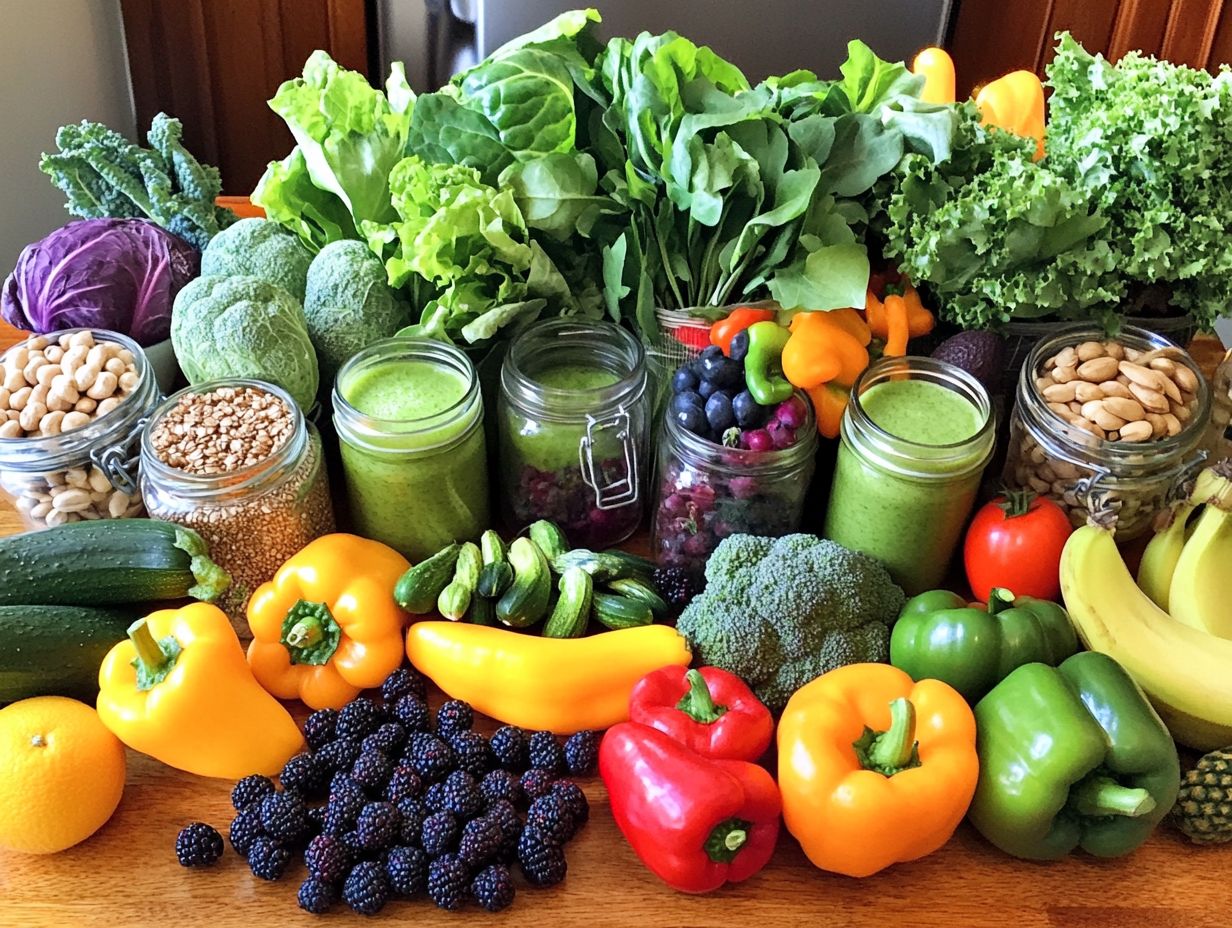 Fruits and vegetables are essential components of a vegan diet, offering vital antioxidants, vitamins, and minerals that support immune health and combat inflammation. Incorporating a diverse array of colorful produce enables individuals with autoimmune diseases to benefit from a wide range of nutrients that promote overall well-being. Foods such as berries, leafy greens, and cruciferous vegetables are particularly beneficial due to their high phytochemical content and anti-inflammatory properties. These foods can be easily integrated into meals and snacks throughout the day. For example, leafy greens like spinach or kale can be blended into smoothies, adding both nutrients and a refreshing taste. Roasted vegetables such as sweet potatoes and Brussels sprouts can serve as satisfying, fiber-rich side dishes, while slices of apple or carrot sticks make crunchy, healthy snacks when paired with hummus.
Fruits and vegetables are essential components of a vegan diet, offering vital antioxidants, vitamins, and minerals that support immune health and combat inflammation. Incorporating a diverse array of colorful produce enables individuals with autoimmune diseases to benefit from a wide range of nutrients that promote overall well-being. Foods such as berries, leafy greens, and cruciferous vegetables are particularly beneficial due to their high phytochemical content and anti-inflammatory properties. These foods can be easily integrated into meals and snacks throughout the day. For example, leafy greens like spinach or kale can be blended into smoothies, adding both nutrients and a refreshing taste. Roasted vegetables such as sweet potatoes and Brussels sprouts can serve as satisfying, fiber-rich side dishes, while slices of apple or carrot sticks make crunchy, healthy snacks when paired with hummus.
2. Whole Grains
Whole grains play a vital role in a vegan diet, providing dietary fiber and resistant starch that can enhance digestive health and offer sustained energy. Foods such as quinoa, brown rice, and whole grain bread not only supply complex carbohydrates but also help maintain a healthy gut microbiome, enriched with beneficial Bifidobacterium, which is essential for immune support, particularly for those suffering from autoimmune diseases such as rheumatoid arthritis. Additionally, these whole grains can help regulate blood sugar levels and reduce inflammation, further promoting overall health. Incorporating various whole grains into daily meals is easy and rewarding.
- For breakfast, oatmeal topped with fresh fruits and nuts can set a positive tone for the day.
- For lunch, quinoa salads mixed with a variety of vegetables and legumes make for a nutritious option.
- If you’re looking for dinner ideas, whole grain pasta or brown rice can serve as a base for stir-fries or curry dishes, creating a wholesome and hearty meal.
Throughout the day, whole grain crackers or popcorn can be enjoyed as snacks. By including these grains in their diet, individuals can savor delicious dishes while reaping significant health benefits, especially when managing conditions related to autoimmune diseases.
3. Plant-based Proteins
Plant-based proteins are essential components of a healthy vegan diet, providing vital amino acids needed for muscle repair, immune function, and overall health. Foods rich in plant-based proteins, such as legumes, nuts, and seeds, serve as excellent sources of protein that help enhance satiety and maintain energy levels while also offering additional nutrients beneficial for individuals with autoimmune diseases. Incorporating a variety of plant-based proteins into the diet ensures that nutritional needs are met and contributes to the promotion of a healthy lifestyle.
4. Healthy Fats
Healthy fats in a vegan diet play an important role in supporting brain function, regulating hormones, and reducing inflammation. Sources of healthy fats, such as avocados, nuts, and seeds, provide essential omega-3 fatty acids, which can be particularly beneficial for individuals with autoimmune diseases. These fats contribute to a balanced diet, enhancing nutrient absorption and supporting a healthy immune system. Along with avocados and nuts, it is advisable to include sources like olive oil, chia seeds, and flaxseeds in daily meals. These ingredients not only enhance flavor but also contain high levels of monounsaturated and polyunsaturated fats that help reduce cholesterol and promote heart health. To incorporate healthy fats into your diet, consider:
- Mixing chia seeds into smoothies
- Using olive oil in salads
- Spreading nut butter on whole-grain bread
These simple tips can help you take advantage of the numerous health benefits that healthy fats offer.
What Foods Should be Avoided in a Vegan Diet for Autoimmune Diseases?
Effective management of autoimmune diseases should include a dietary plan that identifies foods to avoid, as certain items can trigger symptoms and promote inflammation. Processed foods, added sugars, gluten, and dairy products have been shown to contribute to chronic inflammation and negatively impact immune system function. A well-balanced vegan diet for individuals with autoimmune diseases should focus on eliminating these inflammatory triggers, thereby enhancing overall quality of life and improving autoimmune health.
1. Processed Foods
Processed foods are often laden with additives and preservatives that can trigger inflammation and exacerbate symptoms for individuals with autoimmune diseases. These foods typically contain unhealthy fats, refined sugars, and other substances that may negatively impact the immune system, making them unsuitable for a vegan diet and potentially influencing genetic factors related to disease symptoms. By avoiding processed foods and focusing on whole, unprocessed options, individuals can significantly improve their overall health and better manage disease symptoms. Studies published in Foods and Marquette University in 2017 and 2022 emphasize the importance of these dietary changes for autoimmune health. Common processed items, such as sugary breakfast cereals, pre-packaged frozen meals, and packaged snacks, often include synthetic additives and trans fats that can provoke immune responses. According to the American Autoimmune Related Diseases Association (AARDA), it is beneficial to avoid such foods and instead opt for whole grains like quinoa or brown rice, along with fresh fruits and vegetables, and homemade snacks to obtain nutrients without inflammatory additives. Incorporating food sources rich in omega-3 fatty acids, such as flaxseeds and walnuts, can also support balanced immune function. Therefore, making informed food choices can lead to a noticeable improvement in autoimmune health.
2. Added Sugars
 Added sugars are a dietary component that should be avoided in a plant-based diet for those with autoimmune diseases, as they can promote inflammation and worsen disease symptoms. Many processed foods and packaged foods contain high levels of added sugars, which can lead to increased blood sugar levels and trigger further inflammatory responses. By minimizing or eliminating added sugars from their diets, individuals can support their immune system and enhance their overall autoimmune health. Common sources of added sugars include:
Added sugars are a dietary component that should be avoided in a plant-based diet for those with autoimmune diseases, as they can promote inflammation and worsen disease symptoms. Many processed foods and packaged foods contain high levels of added sugars, which can lead to increased blood sugar levels and trigger further inflammatory responses. By minimizing or eliminating added sugars from their diets, individuals can support their immune system and enhance their overall autoimmune health. Common sources of added sugars include:
- sodas
- candies
- baked goods
- some sauces, such as ketchup and salad dressings
These hidden sugars can easily infiltrate daily meals and snacks, subtly undermining autoimmune health. To combat this, individuals can focus on whole plant foods by opting for fresh fruits, vegetables, whole grains, and nuts, which not only satisfy cravings but also provide essential nutrients and dietary fiber. Carefully reading labels, selecting unsweetened products, and preparing homemade meals can greatly improve dietary choices. By consciously choosing healthier alternatives, anyone can significantly reduce their sugar intake and pave the way for better well-being.
3. Gluten
Gluten is a protein present in wheat, barley, and rye, and it can be particularly harmful to individuals with certain autoimmune diseases, such as celiac disease and non-celiac gluten sensitivity. For those with these conditions, exposure to gluten can trigger significant gastrointestinal symptoms, affect the gut microbiome, and provoke immune responses. Therefore, it is recommended that individuals following a plant-based diet avoid gluten-containing foods to promote better gut health and reduce the risk of inflammatory reactions. Gluten exposure poses particular dangers for individuals with autoimmune conditions, as it can lead to a wide range of health issues beyond digestive symptoms and can compromise overall well-being. These individuals often experience debilitating fatigue, joint pain, and even neurological symptoms, making it essential for them to adhere to a strict gluten-free diet to support immune tolerance and reduce chronic inflammation. Fortunately, many gluten-free vegan substitutes are available, including quinoa, buckwheat, and gluten-free oats, which provide important nutrients such as resistant starch without the presence of gluten. To maintain a gluten-free diet, it is beneficial to read labels carefully, explore the produce section, and experiment with creative recipes that incorporate naturally gluten-free foods to meet dietary needs.
4. Dairy Products
Dairy products are a category of foods best avoided in a plant-based diet, especially for individuals with autoimmune diseases like lupus or rheumatoid arthritis, as they can worsen inflammation and trigger immune responses. Many people find that eliminating dairy leads to improvements in symptoms associated with various autoimmune conditions, making it a wise choice for those looking to manage their health more effectively. Transitioning to plant-based dairy alternatives can help maintain a healthy diet while avoiding inflammatory triggers. The link between dairy and inflammation often stems from the presence of lactose, which some individuals have difficulty digesting, and casein, a protein that can provoke allergic reactions. For example, those with multiple sclerosis or rheumatoid arthritis may experience flare-ups when consuming traditional milk or cheese, highlighting the importance of dietary changes. Fortunately, there are many plant-based substitutes available, such as:
- Almond milk
- Coconut yogurt
These alternatives not only offer a creamy texture but also provide beneficial nutrients. Incorporating these alternatives into daily meals can be simple; for instance, using almond milk in smoothies or substituting cashew cheese in pasta dishes allows individuals to enjoy their favorite meals without the drawbacks of dairy, thus supporting a healthy lifestyle.
How to Transition to a Vegan Diet for Autoimmune Diseases?
Transitioning to veganism for managing autoimmune diseases should be approached with care, focusing on gradually altering one s lifestyle and making lifestyle changes to ensure sustainability. Seeking guidance from a healthcare professional, such as a registered dietitian, who understands the significance of dietary choices in individual cases is crucial for ensuring safety and success. Consulting experts like Micah Yu, MD, who are knowledgeable in autoimmune diseases, can also be beneficial. Starting with small, manageable changes and experimenting with new recipes and food products can help individuals gain the confidence needed to transition to veganism successfully. This approach allows them to enjoy a variety of flavorful and nutrient-dense meals that promote optimal immune system function and overall health, emphasizing the concept of food as medicine.
1. Consult with a Healthcare Professional
Consulting with a healthcare professional, such as a registered dietitian, is a crucial step for individuals with autoimmune diseases who are transitioning to a vegan diet. These professionals can provide personalized advice tailored to an individual’s health status, dietary needs, and specific autoimmune conditions, ensuring that nutritional deficiencies are avoided and overall health is optimized. Their expertise helps guide individuals in making informed choices that promote wellness while adhering to a vegan lifestyle. During a consultation, one can expect a comprehensive assessment of their current dietary habits, medical history, and nutritional goals, which will lead to a customized meal plan addressing their unique needs. This is also an opportunity to discuss potential challenges that may arise during the transition, allowing for the development of strategies to overcome them, particularly for those with conditions like systemic lupus erythematosus or Sj gren s syndrome. To find qualified professionals, individuals can seek registered dietitians through professional organizations, local health clinics, or online platforms specializing in nutrition. It is particularly valuable to find someone with experience in vegetarian or vegan diets, especially for those with specific health concerns, to ensure a safe and successful dietary transformation.
2. Gradual Changes and Substitutions
Making incremental changes and substitutions when starting a vegan diet can significantly enhance the experience and increase the likelihood of long-term adherence. Rather than making an abrupt switch, gradually replacing certain meals or components with plant-based alternatives can make the transition feel smoother and more enjoyable. This approach allows individuals to explore new favorite dishes while still enjoying healthier, vegan versions of their old favorites. For instance, a simple way to begin is by using almond or oat milk in place of dairy milk for coffee or cereal. Another effective step is substituting chickpeas or black beans for tuna or chicken in salads, as both options provide protein and great flavor. Meal prepping can also facilitate this dietary shift by ensuring that healthy options are readily available on busy days, supporting autoimmune health and the gut microbiome. Additionally, having a veganized version of a cherished meal can boost motivation; for example, a hearty chili made with lentils instead of meat can be both satisfying and fulfilling, reducing disease symptoms associated with inflammatory bowel disease.
3. Experiment with New Recipes and Foods
Experimenting with new recipes and foods is an enjoyable and exciting aspect of transitioning to a vegan diet. It allows individuals to discover diverse flavors and cooking techniques that help them achieve their health goals. By trying different plant-based ingredients, spices, and cooking methods, one can develop meals that are both nutritious and delicious. This creativity in the kitchen fosters enjoyment in dietary transformations and encourages a long-term commitment to a vegan lifestyle, as highlighted by resources like Forks Over Knives and Foods publication. The journey of plant-based cooking promotes culinary experimentation and introduces individuals to a wealth of online and print resources specializing in vegan recipes. Preparing meals or components of meals in advance is an effective strategy to save time during a busy workweek; dedicating a few hours each week to get ingredients ready or to make full dishes ensures that healthy eating can be quick and straightforward. By experimenting with vibrant vegetables, wholesome grains, and legumes, individuals can create healthy, balanced meals that excite their taste buds and enhance their cooking confidence. Sharing meals with family or friends can further enrich the experience, transforming each cooking adventure into a collective celebration, supporting both autoimmune health and genetic factors.
